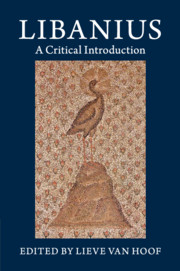Book contents
- Frontmatter
- Dedication
- Contents
- List of tables
- Notes on contributors
- Preface
- Abbreviations
- Introduction: Libanius at the margins
- Part I Reading Libanius
- Part II Libanius’ texts: rhetoric, self-presentation and reception
- Chapter 4 Libanius’ Orations
- Chapter 5 Libanius’ Declamations
- Chapter 6 Libanius’ Progymnasmata
- Chapter 7 Libanius’ Letters
- Chapter 8 The reception of Libanius: from pagan friend of Julian to (almost) Christian saint and back
- Part III Contexts: identity, society, tradition
- Appendices: survey of Libanius’ works and of available translations
- References
- Index locorum
- General index
Chapter 5 - Libanius’ Declamations
from Part II - Libanius’ texts: rhetoric, self-presentation and reception
Published online by Cambridge University Press: 05 October 2014
- Frontmatter
- Dedication
- Contents
- List of tables
- Notes on contributors
- Preface
- Abbreviations
- Introduction: Libanius at the margins
- Part I Reading Libanius
- Part II Libanius’ texts: rhetoric, self-presentation and reception
- Chapter 4 Libanius’ Orations
- Chapter 5 Libanius’ Declamations
- Chapter 6 Libanius’ Progymnasmata
- Chapter 7 Libanius’ Letters
- Chapter 8 The reception of Libanius: from pagan friend of Julian to (almost) Christian saint and back
- Part III Contexts: identity, society, tradition
- Appendices: survey of Libanius’ works and of available translations
- References
- Index locorum
- General index
Summary
Introduction
Most scholars who have come to Libanius have not been likely to engage with the Declamations. They are rhetorical exercises, and until recently rhetoric in general has not had a good press in modern times. They are pieces on imaginary themes primarily associated with the school curriculum. Why go to them when we have Libanius’ orations on real-life themes and his letters, both filled with a wealth of contemporary political, social, prosopographical and cultural information? Nor does one have to visit the declamations to see Libanius’ oratorical skills in full swing; they are fully visible in the orations on real-life themes. Yet to neglect the declamations is to overlook a segment of his work that apparently he himself, as well as his ancient and Byzantine editors, wanted to be part of his literary legacy. This in itself should draw our attention to the declamations. Nor is Libanius the only ancient rhetor or sophist whose literary legacy includes declamations. Aelius Aristides’ corpus includes twelve (Orations 5–16 Lenz-Behr), and we know of other lost declamations of his that he might have been happy to have had preserved. Among Himerius’ orations there are five declamations, although we have only excerpts of them (Orations 1–5 Colonna). The corpus of Choricius of Gaza includes twelve declamations. Even Lucian’s varied oeuvre has four straight sophistic declamations: Phalaris I and II, Tyrannicide and Abdicatus. In its many articles on imperial sophists, the Suda (c. ad 1000) often mentions declamations (meletai) among their works, as it does in its article on Libanius (Λ 486 Adler); occasionally it mentions only a sophist’s declamations.
- Type
- Chapter
- Information
- LibaniusA Critical Introduction, pp. 107 - 127Publisher: Cambridge University PressPrint publication year: 2014



